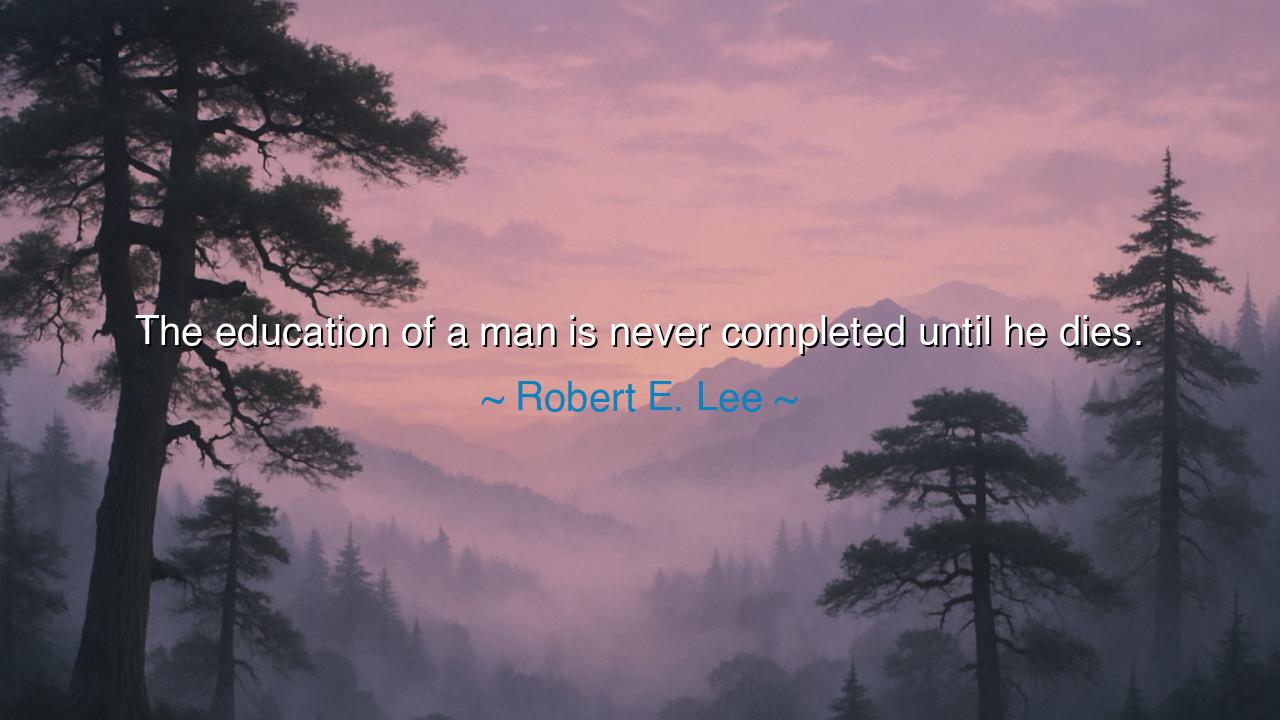
The education of a man is never completed until he dies.






"The education of a man is never completed until he dies." These solemn and stirring words of Robert E. Lee, the Confederate general turned moral philosopher of his age, reach beyond the battlefield into the heart of human existence. In them, there breathes a timeless truth: that education is not confined to youth, nor to classrooms or books—it is the lifelong journey of the soul toward wisdom. Lee, though a soldier, spoke as a sage. He saw that true education is not a moment, but a movement—an unfolding of character, discipline, and understanding that ends only when life itself does.
When Lee uttered these words, he was no longer leading armies, but students. After the Civil War, he became president of Washington College (now Washington and Lee University), dedicating his remaining years to the moral and intellectual rebuilding of a fractured nation. He believed that learning was the foundation of renewal—not just for individuals, but for civilizations. To him, education was not merely the acquisition of knowledge, but the formation of virtue and the pursuit of truth. Every experience, whether triumph or sorrow, was a teacher; every day offered new lessons for those humble enough to learn. Thus, in Lee’s eyes, a man remained a student of life until the final breath left his body.
There is a profound humility in this vision. It reminds us that the wise never declare themselves wise; they remain forever open to growth. History proves this through countless lives. Consider Leonardo da Vinci, whose brilliance spanned art, science, and invention. Even in his last years, with masterpieces behind him and fame surrounding him, Leonardo filled his notebooks with questions—endless sketches, hypotheses, and wonder. His curiosity did not fade with age; it deepened. Like Lee, he understood that to cease learning is to begin dying. Education, for both men, was not a means to an end, but an eternal striving—a sacred hunger to understand the mysteries of the world and of the self.
The ancients, too, taught this same truth. Socrates, when accused of ignorance, declared, “I know that I know nothing.” In this paradox lies the highest form of wisdom. The one who knows his limits becomes limitless, for he is forever learning. This humility is the beating heart of Lee’s philosophy. The education of life—the trials, the failures, the lessons carved into the soul—teaches more than any book. It molds virtue from suffering, and patience from defeat. The man who learns from experience, who transforms pain into understanding, walks the path of true education.
Yet, how many today mistake education for credentials, and knowledge for wisdom? The world prizes the diploma, the degree, the outward sign of learning, but neglects the inward growth of the spirit. Lee’s words rise as a rebuke to such narrow vision. For he knew that no institution can grant the wisdom that comes from living honorably, thinking deeply, and loving truthfully. Education, he said, must extend beyond youth—it must become the habit of a lifetime. The scholar who ceases to question becomes arrogant; the worker who ceases to learn becomes stagnant. The man who believes he has nothing left to learn has already begun to fade.
There is, too, in Lee’s statement, a quiet heroism—the idea that life itself is the greatest teacher, and death its final graduation. Every sorrow is a lesson in endurance; every joy, a lesson in gratitude; every failure, a reminder of humility. To live well, then, is to learn continually. The man who listens—to others, to experience, to the still voice of conscience—finds in every moment a new revelation. This endless learning does not weaken him; it ennobles him. For it is through lifelong education that one transforms mere existence into meaning.
Let this, then, be the lesson carried forward: Never cease to learn. Let the mind remain young though the body grows old. Seek wisdom in books, in people, in nature, in every passing hour. When you stumble, let the fall instruct you; when you triumph, let the victory humble you. Remember, as Robert E. Lee taught, that the purpose of education is not completion—it is continuation. It is the soul’s constant ascent toward understanding. And when the final day comes, when the last page of life is turned, let it be said that you were still learning—that you were, until your last breath, a student of Life.






AAdministratorAdministrator
Welcome, honored guests. Please leave a comment, we will respond soon